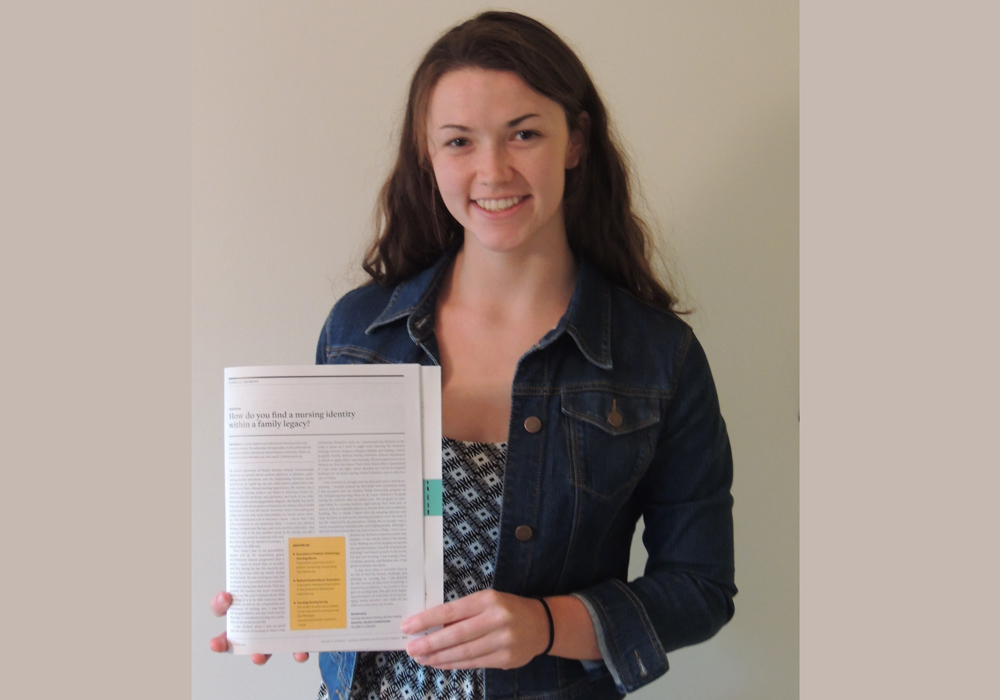Most of the basic material a writer works with is acquired before the age of fifteen
Young authors have so much to share, and they shouldn’t think that what they have to say isn’t worthy of publication just because they’re young. I’ve had the privilege of mentoring young authors on many occasions. Recently, I had the joy of watching a novice author actually open a journal and see her article in print. It was made even more special because it was my daughter, Elaine, who is a senior nursing student at Saint Louis University School of Nursing. She shared her personal story about her decision to become a nurse in the Clinical Moment feature in the Clinical Journal of Oncology Nursing’s (CJON’s) October 2017 issue.
Many young nurses and nursing students, and even more seasoned veteran nurses, don’t realize the vast opportunities to write about their experiences as nurses. More to the point, there are many different options to support their writing and help them be successful. Part of CJON’s mission is “to provide practical information necessary to care for patients and their families across the cancer continuum and to develop publication skills in oncology nurses.”
Clinical Moments
CJON serves as an avenue to help novice writers get their ideas into publication, and it provides several different opportunities. The Clinical Moment feature allows nursing students and new nurses to write about a meaningful or life-changing oncology nursing experience. The pieces are about 500 words and are written in the first person. It’s a great chance to share one’s story. In fact, one of my students wrote about her experience of being asked to be a bone marrow donor as a nurse who cares for pediatric patients with cancer. There are numerous topics and possibilities for this feature, and nurses can freely explore experiences personal to them.
Mentorship to Full-Length Articles
Another opportunity in CJON is the Writing Mentorship program. This program is for ONS members who have never published in a peer-reviewed journal. The process is simple: A novice writer is paired with a more experienced author who provides structure, guidance, and support to get a full-length paper (about 3,000 words) to publication. I’ve had the privilege of being a mentor with several authors. Most recently, I worked with Elisabeth King on a review of recent changes affecting genetic testing for hereditary susceptibility for developing cancer, published in the October 2017 issue.
Although, I didn’t get to watch Elisabeth see her piece in print when the journal arrived, I hope it was as happy as what I observed with my own daughter. I’ve never actually met Elisabeth in person, but I feel like I know her through our countless conversations and collaborations. It’s important to note that being in geographic proximity is not a requirement for the writing mentorship program. Anyone interested in writing can submit a brief application and a topic they would like to explore.
The program also depends on seasoned writers to volunteer their services and apply to be a mentor. Both budding writers and seasoned mentors send their application to CJON, and the program matches a new writer with the right mentor. This is the first time I have mentored a writer on a topic with which I am familiar. It did make it special to me, but it’s not a requirement when becoming a mentor. I have learned much from mentoring nurses on topics with which I am not so familiar.
Concise Columns
Columns are another potential opportunity for newer writers. Because many oncology nurses work in specialized areas, you may have a unique experience to share in the form of a column. Three years ago, I worked with a young writer who was taking an independent study with me as a senior nursing student. We discussed potential topics, and she was somewhat bothered by a medication error she had observed as a nursing student. It became apparent that the healthcare system wasn’t equipped to protect against this error. She had something important to share with other oncology nurses.
At the time she did not feel ready to write the article independently, so I served as a second author and provided guidance on the writing process along the way. The article appeared in one of the columns in which associate editors provide guidance and support to help through publication process. Columns are typically about 1,500 words, so it’s not generally an overwhelming experience for new writers.
Although I wasn’t involved much with my daughter’s submission (which is important in terms of the mother-daughter relationship), Elaine needed to figure out how to write it with other support. She worked directly with the editor, Ellen Carr, who supported and encouraged her, provided structure, and set achievable deadlines. When I read the article, I learned things I was not aware of in my daughter’s journey into nursing. As discussed in the paper, Elaine is the youngest of my three daughters—all of whom have become nurses—and I didn’t realize until I read her article how challenging the decision was for her. Her words caused me to think about how young people make their decisions, the importance of life-changing events, and the socialization and learning that occurs in nursing school. Elaine had important thoughts to share with others, and the Clinical Moment feature gave her the perfect opportunity to do so.
Novice writers have much important information and experiences to share. ONS works to provide resources and opportunities to make this a reality. I hope to hear about many more happy faces when future authors get to see their names in print. As Henry Miller once said “Writing is its own reward.”






